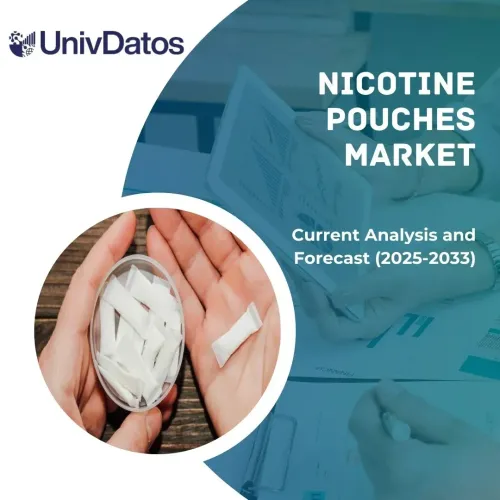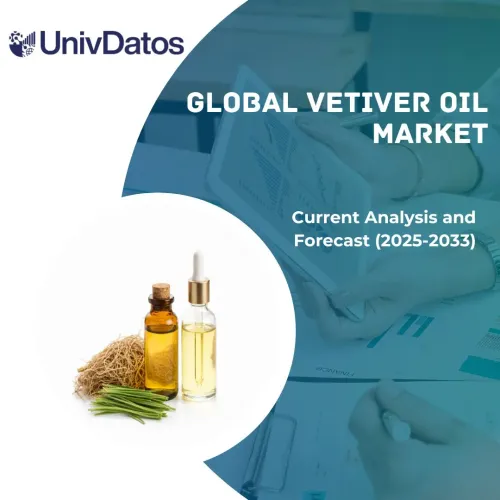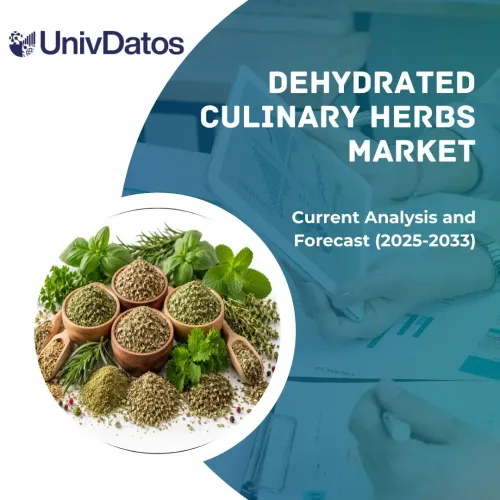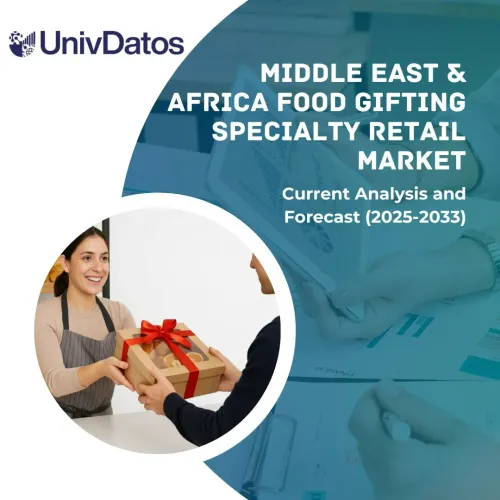- Home
- About Us
- Industry
- Services
- Reading
- Contact Us
Artisanal Bakery Products Market: Current Analysis and Forecast (2025-2033)
Emphasis on By Type (Bread & Rolls, Cakes & Pastries, Cookies, Others); By Category (Conventional, Gluten-free), Others); By Distribution Channel (Store-Based, Non-Store-Based); and Region/Country
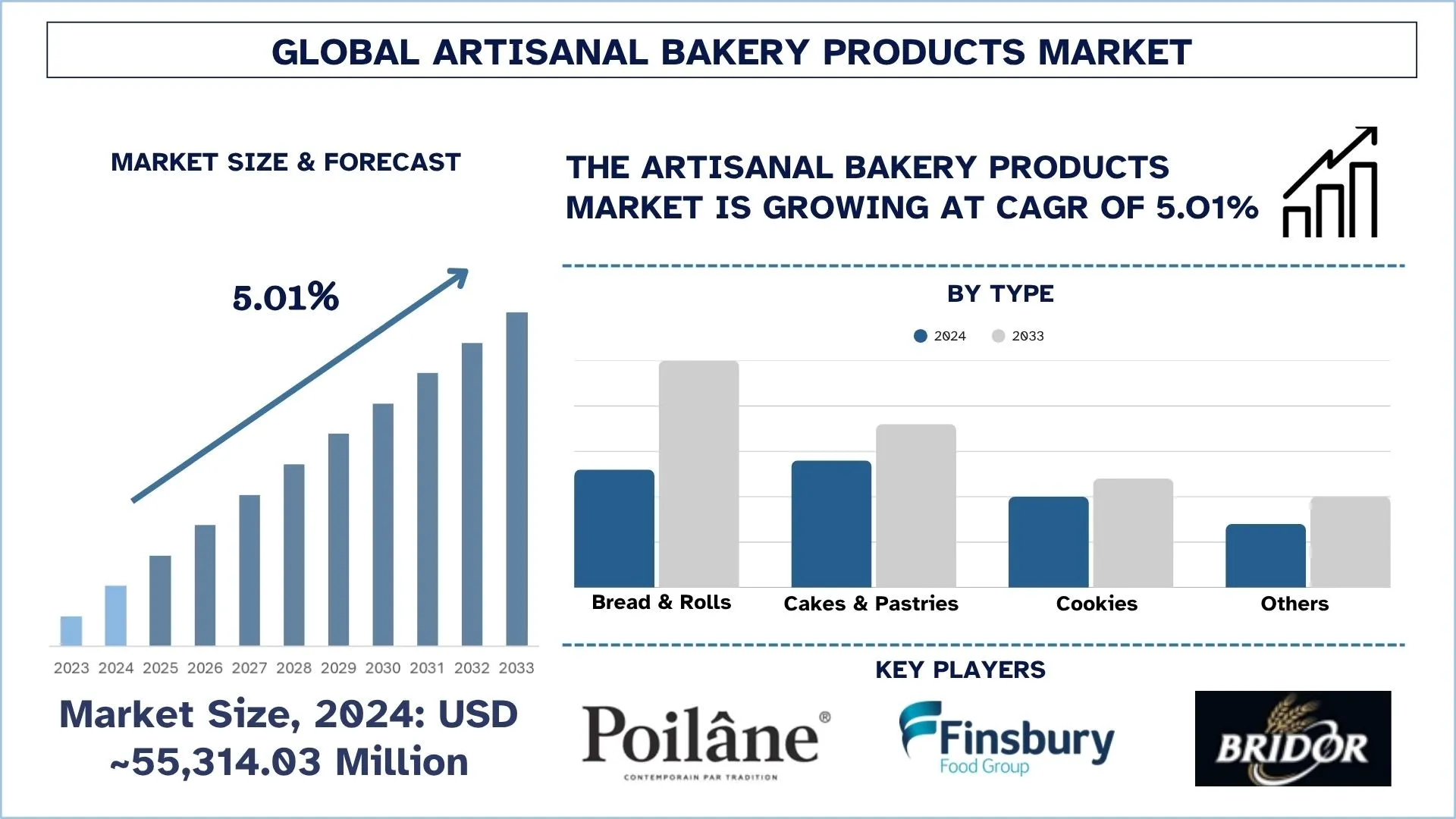
Artisanal Bakery Products Market Size & Forecast
The Artisanal Bakery Products Market was valued at USD 55,314.03 million in 2024 and is expected to grow at a strong CAGR of 5.01% for the forecast period (2025- 2033F) due to the growing urbanization and a busy lifestyle, craving for ready-to-eat snacks, and rising demand for healthier food items.
Artisanal Bakery Products Market Analysis
The artisanal bakery category is experiencing increased popularity, driven by dynamic trends in lifestyle and eating habits, shifting consumer tastes in food, and the growing influence of Western culture. Artisanal baking is the method in which skilled bakers utilize their craft skills to apply hands-on processes to produce high-quality bread. The artisanal bakery offers unique and special crafts in a food world dominated by science, tradition, and the love of baked goods, where consumers seek to eat not a branded food item, but rather something with a distinct taste and ingredients. Additionally, it utilizes simple ingredients such as flour, water, yeast, and salt, which undergo slow fermentation processes, blending the flavor and texture gradually over time. Therefore, there has been a surge in artisanal bakery products, inextricably linked to increased purchasing power, tourism, and holidaying, as well as the growing youth demographic.
Artisanal Bakery Products Market Trends
This section discusses the key market trends influencing the various segments of the artisanal bakery products market as identified by our research experts.
Rising Indulgent Treat
The growing presence of indulgent retreat experiences has significantly altered the growth of the global artisanal baked goods market. Often, long lines of millennials and Gen Zs can be seen in front of bakeries, showcasing the real experience of the artisanal bakery market, which is gaining momentum by enhancing the taste, texture, and look of their products. Additionally, people are recognizing and appreciating the bread that genuine artisan bakers have lovingly crafted. Furthermore, travelers also want to experience the handmade products created from sustainably farmed grains, which are free from preservatives and emulsifiers. As small bakers utilize their craft and baking skills, maintaining authenticity resonates with consumers. Hence, the trend toward indulgent desserts is driving growth in the artisanal baked goods category, as consumers seek to consume food that creates value, fosters interactions, and promotes engagement, often provoking heightened emotional experiences.
Artisanal Bakery Products Industry Segmentation
This section provides an analysis of the key trends in each segment of the global artisanal bakery products market report, along with forecasts at the global, regional, and country levels for 2025-2033.
The bread & rolls product category dominates the Artisanal Bakery Products market.
Based on type, the market is segmented into bread & rolls, cakes & pastries, cookies, and others. The bread & rolls dominated the market as they are the staple diet of many countries. It includes products such as baguettes, ciabatta, sourdough, focaccia, swirl, or tin bread. Artisanal bread and rolls are crafted by a meticulously designed bakery that prioritizes quality, maintains strict sanitation standards, and offers flexible production capabilities. Further, the development of high-speed sheeting technology has also optimized the production process, which many bakeries have also adopted. Bakeries and companies are continually innovating, developing new artisanal products. As an example, on September 18, 2024, La Brea Bakery rolled out its Take and Bake artisanal breads to target more than 1000 bakery stores.
The gluten-free products category dominates the Artisanal Bakery Products market.
Based on category, the market is segmented into conventional and gluten-free. Gluten-free products dominate the artisanal bakery products market due to the rising health consciousness among individuals. Additionally, gluten is harmful to the person who has celiac disease, resulting in intestinal problems such as diarrhea, constipation, gas, etc. Further, gluten-free foods are known to have a low GI and calorie content. This helps reduce weight and combat obesity, providing more energy than baked products, which contributes to its higher market demand.
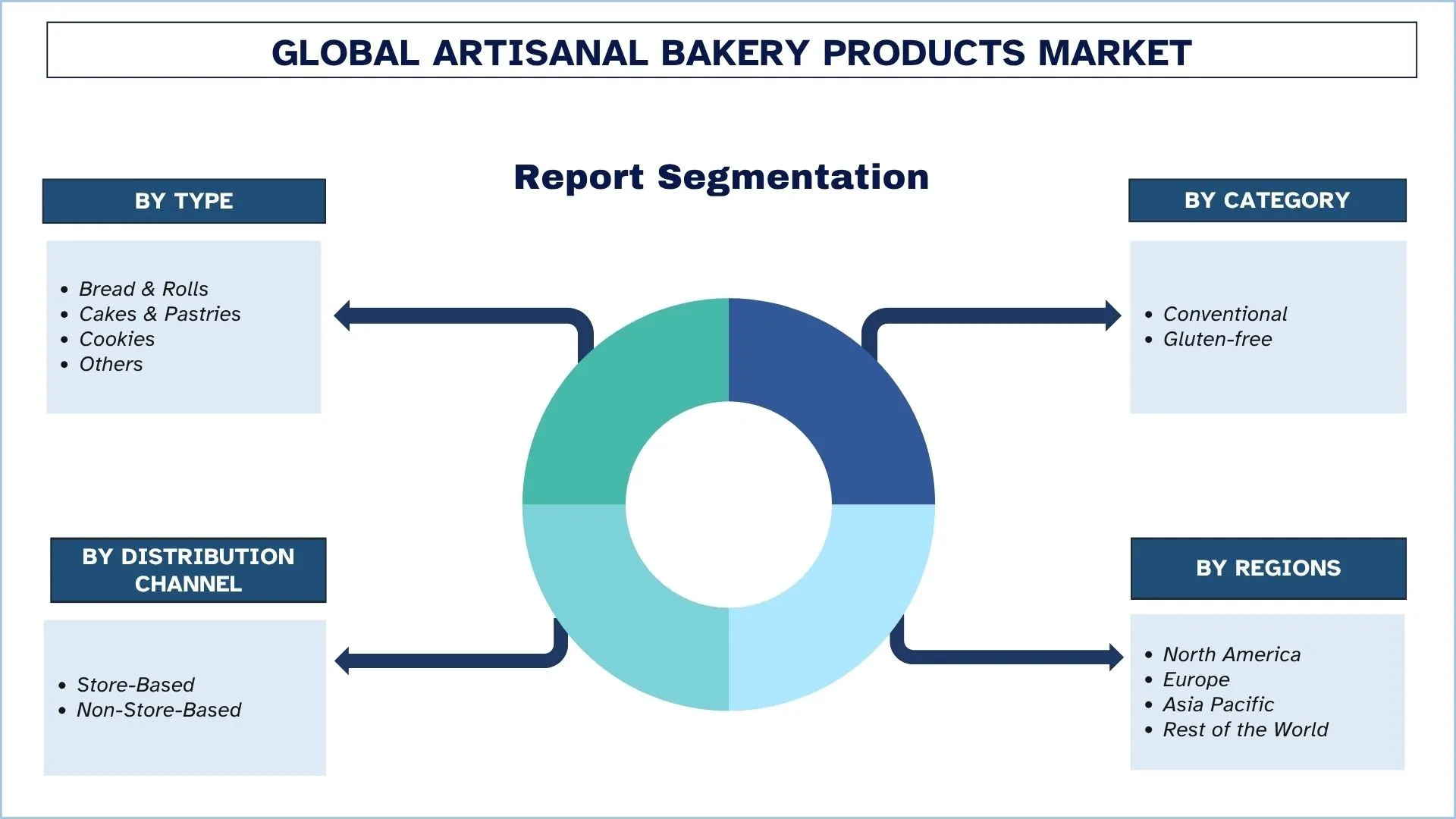
North America held a dominant share of the Artisanal Bakery Products market in 2024.
The North America region witnessed a spurring growth in the Artisanal Bakery Products market, owing to higher consumer demand for premium and authentic baked goods, the widespread health and wellness trend, and efficient distribution channels. Additionally, manufacturers and retail bakers have successfully incorporated grains and increased fiber in baked goods, utilizing healthy ingredients such as Omega-3 and Omega-6 fatty acids, protein, vitamins, minerals, prebiotics, and probiotics. Furthermore, intense media coverage of the obesity epidemic has led to new dieting trends, and a wave of health-conscious consumers is becoming part of the American mainstream, as they are increasingly found in more retail outlets, as well as restaurants and other foodservice establishments. Clean and transparent labels, plant-based proteins, gluten-free, and ancient grains are expected to drive the growth of this industry. Hence, there is a growing shift toward healthier lifestyles, with an increasing belief that gluten-free products are more nutritious. Moreover, the use of coupons and certificates by businesses offering consumers discounted prices after an initial purchase is also driving market growth in the North American region.
The U.S. held a dominant share of the North American Artisanal Bakery Products market in 2024.
The growth of the artisanal bakery products market in the United States is driven by intense urbanization, a shifting lifestyle that favors convenience and on-the-go snacking, advancements in modern baking technologies, and the increasing influence of social media. In the United States, consumers are willing to pay even higher prices for low-fat, gluten-free, handmade products that offer unique flavors, textures, and experiences. Furthermore, the evolving lifestyle is shifting consumer attitudes toward bakery products, prompting innovation in the category that provides both health and functional benefits. In addition, consumer efforts to live a healthier lifestyle and eat a more balanced diet are compelling the manufacturers to reformulate their products by removing undesirable ingredients and adding those that are more sought after. With the proliferation of baking television programs and social media, consumers now want to create and display their bakery items as they post pictures of the food items.
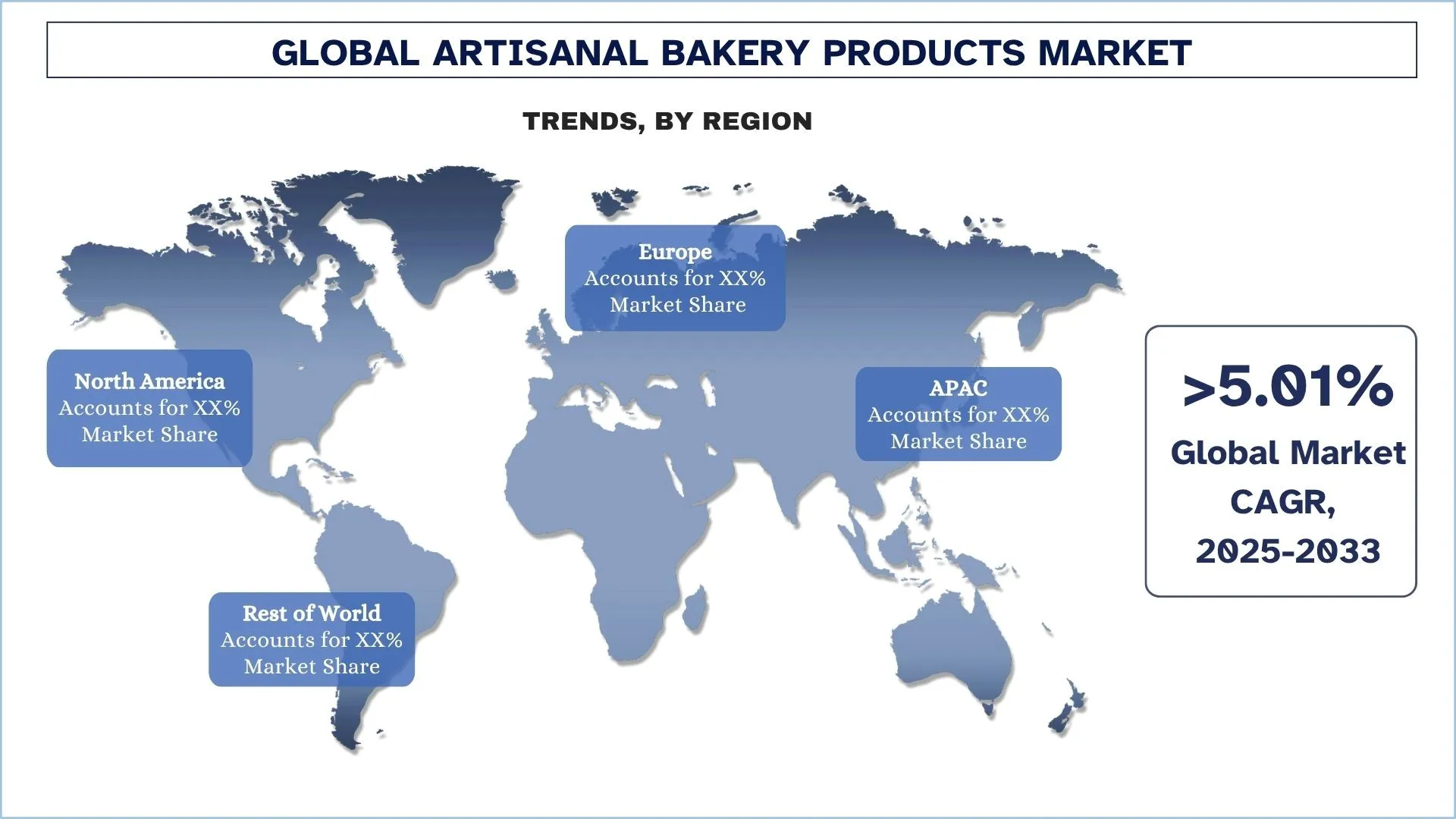
Artisanal Bakery Products Competitive Landscape
The artisanal bakery products Market is competitive and fragmented, with several global and international market players. The key players are adopting different growth strategies to enhance their market presence, such as partnerships, agreements, collaborations, new product launches, geographical expansions, and mergers and acquisitions.
Top Artisanal Bakery Products Companies
The major players operating in the market are Poilâne, Finsbury Food Group Limited, Bridor (LE DUFF Group), Bauli Group, E5 BAKEHOUSE, Aryzta AG, Lantmannen Unibake, Bimbo® Bakehouse (Grupo Bimbo), Yamazaki Baking Co., Ltd., and Tartine Bakery.
Artisanal Bakery Products Market News
On March 28, 2025, Vandemoortele, a long-established family-owned food group with a footprint across Europe, and VIVESCIA Group, one of the French grain cooperative groups, announced that they would enter into an agreement relating to the acquisition by Vandemoortele of Délifrance. Délifrance is a global B2B brand renowned for its high-quality frozen bakery products, which embody the excellence of French baking.
On 15th April 2024, BRIDOR, a subsidiary of LE DUFF Group, announced the acquisition of PANDRIKS Holding B.V., a company that makes organic and artisanal-inspired bakery products. With this significant acquisition, BRIDOR continues its strong global growth, emphasizing LE DUFF Group’s commitment to accelerating its development in the bakery sector.
On 31st July 2024, CTH Invest SA, a Ferrero Group-related company, planned to acquire artisanal biscotti cookie and baked foods maker Nonni’s Bakery, dba Nonni’s Foods LLC, from private equity firm Vestar Capital Partners.
Artisanal Bakery Products Market Report Coverage
Details | |
Base year | 2024 |
Forecast period | 2025-2033 |
Growth momentum | Accelerate at a CAGR of 5.01% |
Market size 2024 | USD 55,314.03 million |
Regional analysis | North America, Europe, APAC, Rest of the World |
Major contributing region | Asia-Pacific is expected to grow at the highest CAGR during the forecasted period. |
Key countries covered | U.S., Canada, Germany, United Kingdom, Spain, Italy, France, China, Japan, and India |
Companies profiled | Poilâne, Finsbury Food Group Limited, Bridor (LE DUFF Group), Bauli Group, E5 BAKEHOUSE, Aryzta AG, Lantmannen Unibake, Bimbo® Bakehouse (Grupo Bimbo), Yamazaki Baking Co., Ltd., and Tartine Bakery. |
Report Scope | Market Trends, Drivers, and Restraints; Revenue Estimation and Forecast; Segmentation Analysis; Demand and Supply Side Analysis; Competitive Landscape; Company Profiling |
Segments Covered | By Type, By Category, By Distribution channel, By Region/Country |
Reasons to buy the Artisanal Bakery Products Market report:
The study includes market sizing and forecasting analysis validated by authenticated key industry experts.
The report briefly reviews overall industry performance at a glance.
The report covers an in-depth analysis of prominent industry peers, primarily focusing on key business financials, product portfolios, expansion strategies, and recent developments.
Detailed examination of drivers, restraints, key trends, and opportunities prevailing in the industry.
The study comprehensively covers the market across different segments.
Deep dive regional-level analysis of the industry.
Customization Options:
The Global Artisanal Bakery Products Market can be customized according to specific requirements or any other market segment. Besides this, UnivDatos understands that you may have your own business needs; hence, feel free to contact us to get a report that completely suits your requirements.
Table of Content
Research Methodology for the Artisanal Bakery Products Market Analysis (2023-2033)
We analyzed the historical market, estimated the current market, and forecasted the future market of the global artisanal bakery products market to assess its application in major regions worldwide. We conducted exhaustive secondary research to gather historical market data and estimate the current market size. To validate these insights, we carefully reviewed numerous findings and assumptions. Additionally, we conducted in-depth primary interviews with industry experts across the artisanal bakery products value chain. After validating market figures through these interviews, we used top-down and bottom-up approaches to forecast the overall market size. We then employed market breakdown and data triangulation methods to estimate and analyze the market size of industry segments and subsegments:
Market Engineering
We employed the data triangulation technique to finalize the overall market estimation and derive precise statistical numbers for each segment and sub-segment of the global artisanal bakery products market. We split the data into several segments and sub-segments by analyzing various parameters and trends, including type, category, and distribution channel within the global artisanal bakery products market.
The main objective of the Global Artisanal Bakery Products Market Study
The study identifies current and future trends in the global artisanal bakery products market, providing strategic insights for investors. It highlights regional market attractiveness, enabling industry participants to tap into untapped markets and gain a first-mover advantage. Other quantitative goals of the studies include:
- Market Size Analysis: Assess the current forecast and market size of the global artisanal bakery products market and its segments in terms of value (USD).
- Artisanal Bakery Products Market Segmentation: Segments in the study include areas of type, category, and distribution channel.
- Regulatory Framework & Value Chain Analysis: Examine the regulatory framework, value chain, customer behavior, and competitive landscape of the Artisanal Bakery Products industry.
- Regional Analysis: Conduct a detailed regional analysis for key areas such as Asia Pacific, Europe, North America, and the Rest of the World.
- Company Profiles & Growth Strategies: Company profiles of the artisanal bakery products market and the growth strategies adopted by the market players to sustain the fast-growing market.
Frequently Asked Questions FAQs
Q1: What is the Artisanal Bakery Products market's current size and growth potential?
The Artisanal Bakery Products Market was valued at USD 55,314.03 million in 2024 and is expected to grow at a CAGR of 5.01% during the forecast period (2025-2033).
Q2: Which segment has the largest share of the Artisanal Bakery Products market by type?
The bread & rolls segment holds the largest share in the artisanal bakery products market, driven by their status as a staple food across many countries and consistent consumer demand for fresh, handcrafted bread.
Q3: What are the driving factors for the growth of the Artisanal Bakery Products market?
Growing urbanization and a busy lifestyle: The movement of people to urban centers has led to increasingly busier lifestyles, and in turn, has increased the demand for convenient yet high-quality food products.
Craving for ready-to-eat snacks: The rising demand for ready-to-eat snacks is driving the global artisanal bakery products industry by catering to busy consumer lifestyles with convenient, on-the-go options like grab-and-go pastries and pre-packaged baked goods, which blend quality, taste, and convenience to meet modern food consumption patterns.
Rising demand for healthier food: The rising global demand for healthier food, spurred by growing health consciousness, has driven consumers toward artisanal bakery products rich in whole grains, organic and preservative-free ingredients, and functional flours, positioning them as a trusted alternative to mass-produced offerings and fueling market growth.
Q4: What are the emerging technologies and trends in the Artisanal Bakery Products market?
Demand for gluten-free food: The surging demand for gluten-free foods, fueled by rising health awareness, increasing celiac and gluten sensitivities, and consumers perceiving gluten-free as a healthier lifestyle choice, has become a significant growth driver in the global artisanal bakery market.
Rising Indulgent treat: Merging the craving for premium experiences with everyday snack habits, the rising indulgent‐treat trend—characterized by rich flavors, multi-textural pastries, single-serve luxury, and innovative formats—is elevating global artisanal bakery growth by tapping into consumers’ desire for affordable indulgence and experiential snacking.
Q5: What are the key challenges in the Artisanal Bakery Products market?
Food Safety Regulations: Global artisanal bakeries increasingly face the challenge of navigating complex, costly food safety regulations from stringent HACCP and allergen labeling mandates to sanitation, traceability, and temperature control protocols across multiple jurisdictions, which strain small-scale producers both operationally and financially.
Certificate compliance: Bakeries must invest considerable time, money, and expertise to obtain and maintain certifications such as HACCP, organic, gluten-free, and allergen labels, which create substantial administrative, operational, and financial burdens for small-scale artisanal bakeries striving to meet diverse global standards.
Q6: Which region dominates the Artisanal Bakery Products Market?
The North America region witnessed a spurring growth in the Artisanal Bakery Products market, owing to higher consumer demand for premium and authentic baked goods, the widespread health and wellness trend, and efficient distribution channels.
Q7: Who are the key players in the Artisanal Bakery Products market?
Some of the Leading companies in Artisanal Bakery Products are:
• Poilâne
• Finsbury Food Group Limited
• Bridor (LE DUFF Group)
• Bauli Group
• E5 BAKEHOUSE
• Aryzta AG
• Lantmannen Unibake
• Bimbo® Bakehouse (Grupo Bimbo)
• Yamazaki Baking Co., Ltd.
• Tartine Bakery
Q8: What are the key investment opportunities in the global Artisanal Bakery Products industry?
Global investment in artisanal bakery products is being driven by opportunities in health oriented specialty offerings (such as gluten free and whole grain), the expansion of e commerce and direct to consumer channels, growth in emerging markets like Asia-Pacific and Latin America, scalable infrastructure and shared-use kitchens, and sustainable packaging innovations all supported by rising consumer demand for premium, authentic, and convenient baked goods.
Q9: How are mergers, acquisitions, and brand collaborations shaping the Artisanal Bakery Products landscape?
Mergers, acquisitions, and brand collaborations are enabling artisanal bakery companies to strengthen their technological capabilities, expand distribution and product portfolios, achieve economies of scale, and meet the rising consumer demand for premium, health-oriented baked goods, thereby fundamentally reshaping the competitive landscape.
Related Reports
Customers who bought this item also bought


